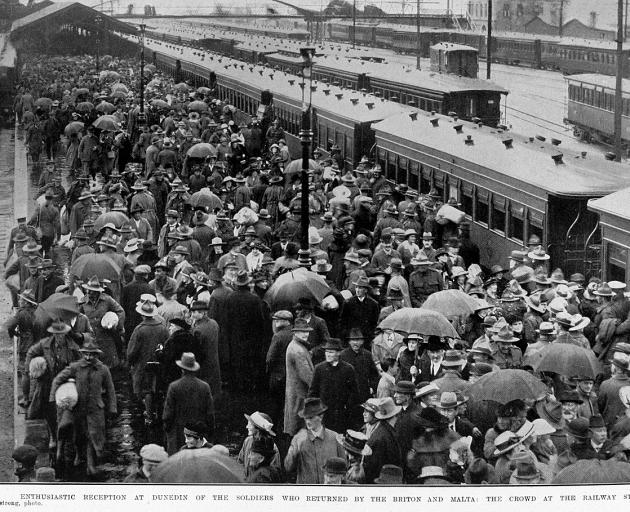
There's grass outside the window. I never thought I'd be so happy to see grass!
After months of nightmarish mud and blood, grass has become the most welcome sight in the world.
We're all staring out the windows at the grass. All the boys, connected by the horrors only we have seen. All of us impatient, desperate for that first familiar glimpse of home.
Conversation turns to those whom we hope are waiting for us. Do they even know today's the day? Will they be there when this train finally pulls to a stop or will we have to walk all the way home before we can see them?
By the time soldiers returning from World War 1 reached Dunedin Railway Station they had travelled half a world, or more. There may have been little distance left to cover, but there would be no chance they would have to walk. Those at home were determined to demonstrate their gratitude from the first. So, every time a transport arrived in Dunedin, Otago Motor Club members turned out in force to personally transport the soldiers and their closest relatives to their homes.
A report in the Otago Daily Times of January 13, 1919 captures one such moment: "As each car left the square with one or two soldiers and their friends, the crowds of citizens outside the enclosure cheered lustily."
The significance of the action is easy to overlook in an age when cars are ubiquitous. But few then had one. When soldiers returned in large numbers, even car owners who did not belong to the club also went to collect them at the railway station.
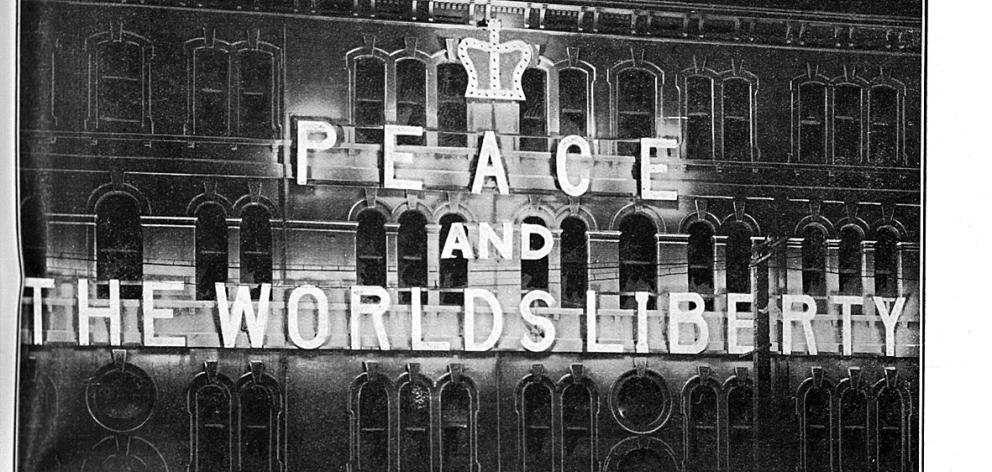
The general public were determined to begin repaying the debt they felt to the troops.
Great celebrations took place when soldiers returned home by train or troopship. The Otago Daily Times would publish the names of the men due to return as well as the names of their next of kin and detailed when each train or ship was due so people could gather to meet them. Almost always there would be large crowds assembled both at Port Chalmers and at Dunedin Railway Station. Even as late as June 1919, when a group of soldiers returned, the crowds who came stretched from the railway station to the Octagon.
When the troopship Tahiti returned in January 1919, no less than four bands assembled at the railway station to welcome them home, the 4th Regimental Band already having played at Port Chalmers when their troopship docked. The enthusiasm of the Dunedin public was unquestionable and people would travel from all over the city to welcome home their men.
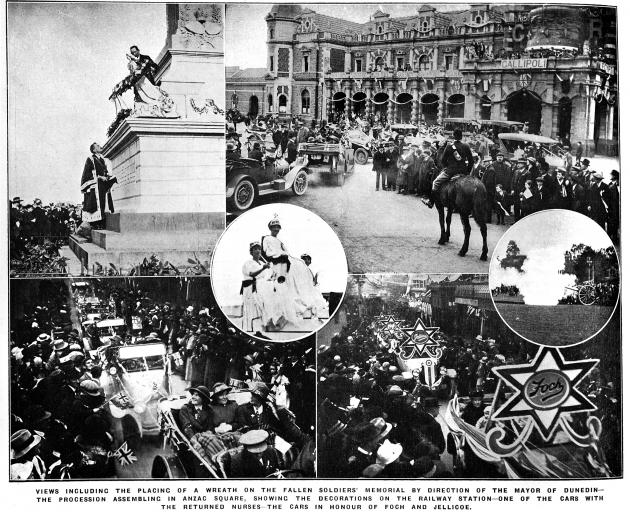
The writer's disappointment at the state of affairs conveys the general sentiment of the public: "There certainly seems to be an utter want of ordinary business ability on the part of someone and a failure to appreciate the patriotism of the public in its being supposed that one car on each of the various routes was going to carry all in who wished to welcome the returning troops."
They were determined to make good on the promise made to the soldiers before they left - a "fitting reception if Providence ordained that they should be spared to come through the great fight and return to us".
Only the reception of the Maunganui troopship in June 1919 proved a disappointment to the soldiers returning. A returned soldier immediately wrote to the editor of the Otago Daily Times asking "Where were all our patriotic people yesterday morning when the troopship Maunganui arrived at the wharf with returned soldiers?" He went on to state that "yesterday's proceedings were a disgrace to the whole community". Unknown to the soldier, the public had actually been specifically asked not to travel to meet the men at Port Chalmers as "the heavy traffic would impede the speedy transport of soldiers".
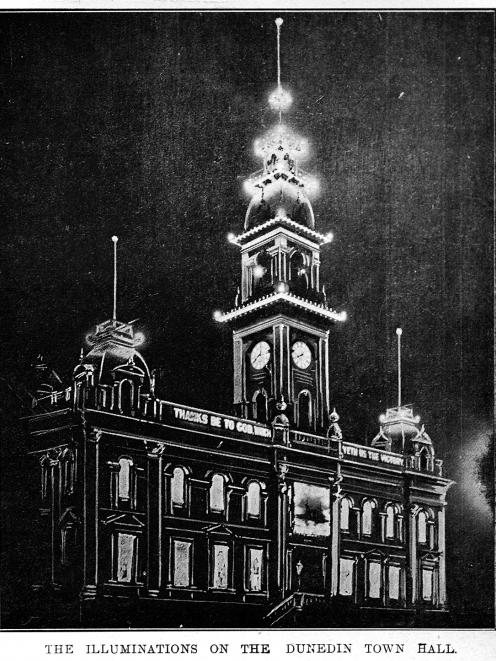
The authorities had the best intentions, wanting to ease the process of disembarkation as much as possible. The public complied because they thought it was for the best, but the soldiers were left without a welcoming party.
January 1919 saw the arrival of 418 returned soldiers. Of those, 193 lived south of Dunedin, but flooding meant the south-bound train had to be postponed. Accommodation was scarce that weekend so Mayor James John Clark called for members of the public to come forward and billet the soldiers in their homes. Volunteers arrived at the Town Hall in droves. Within a few hours there were five times the number of offers needed, and it was necessary for the Mayor to apologise for the disappointment of those whose offers could not be accepted: "Dunedin once again showed in a practical way a splendid appreciation of the men who have done such glorious work at the battlefront. ... I regret that so many were disappointed in not being provided with a soldier guest."
The staggered nature of the soldiers' return to Dunedin over the course of several years meant that individual suburbs took it upon themselves to welcome the returned soldiers of their area. Welcoming socials were held and well supported, even when there were just two returned soldiers to the suburb, as was the case in Merton, just north of the city, in June 1919: "A very large assembly of people met together in the school at Merton, to publicly welcome home Privates Dave Ritchie and A.Davidson, who have recently returned from the war."
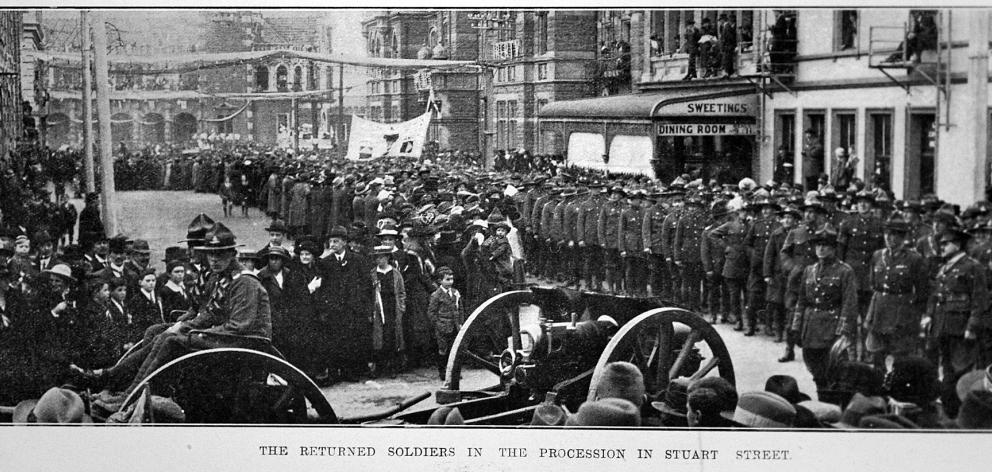
The Taieri Returned Soldiers' Association was gifted a piano by the Taieri Women's Patriotic Association.
About 400 people attended a welcome social for the soldiers at the Seacliff Mental Hospital, during which 29 soldiers were given gold medals for their service.
People did not just move on with their lives when peace was declared. Rather, the declaration of peace simply meant a transition to a period of deep gratitude to the soldiers, and the strengthening of a general desire to provide for their every need.
The main recognition of Dunedin's soldiers was held in conjunction with five days of peace celebrations. Celebrations such as these were held across New Zealand and in many Allied countries, yet these events are largely unknown today.
Dunedin's celebrations officially began on the evening of Friday, July 18, 1919. Streets were decorated and buildings, shops and even a tram were decorated with light displays.
Entertainment was provided for the returned soldiers, as well as a packet of cigarettes each. Hillside bonfires and a fireworks display at Waverley Hill added to the spectacle. Ever in the mind of the public, disabled soldiers were collected by those with cars who took them on tours around the city to see the light displays for themselves.
Saturday, July 19, 1919 saw the pinnacle of the peace celebrations, beginning with church services and a minute's silence in the morning before a major street procession. So many were involved in the procession it took three-quarters of an hour for it to entirely pass one point. The returned soldiers section in the parade was described by the Otago Daily Times as "the keystone of the whole procession" involving more than 1000 soldiers marching in uniform as the crowds cheered. It was the day that, for perhaps the first time, the soldiers were celebrated as a cohort, rather than in their respective smaller returning groups.
The peace celebrations served as Dunedin's way of thanking the soldiers for their service, celebrating their return and extending the public's continued support. As on the Friday, motor cars collected 60 men from the hospital so that they too could watch the grand procession from the Savoy Tea Rooms - such a small act of thoughtfulness, yet so significant. It demonstrates perfectly the extent to which the Dunedin public delivered on their promise that the soldiers would be welcomed back with open arms.
Perhaps the most poignant event in the peace celebrations was the mass meeting at the Kensington Drill Hall, held the evening of July 19, 1919. An Otago Daily Times report of the event records that "the attendance taxed the holding capacity of the hall to the utmost" - a hall that had been prepared to seat up to 7000 people with a further 4000 standing.
In his address, the Mayor, Mr W. Begg, recognised the soldiers present, saying "we acknowledge the dauntless bravery, sublime endurance, and splendid chivalry, and recognise the noble part they played in making the victory we celebrate today the real and tangible thing it is". The Minister of Defence, Sir James Allen, followed him and began his address by recognising the soldiers present - both those who received decorations that night, and those who did not. He also paid tribute to the courage of a father who received a decoration on behalf of his son, who would never return, for which there was loud applause. The Rev S.G. Griffith, a Church of Christ minister, was the last to speak and his address focused on the need for the public to take action to ensure that the soldiers received the absolute best.
"We never had cause to be ashamed of them, and we must see to it that they were never ashamed of us," he said. "Other wars brought a harvest of maimed begging ... the dominion could not demean herself by allowing it."
Addresses such as these served to cement in the minds of the public an attitude of indebtedness and the strong desire to do right by the soldiers.
The overwhelming relief that accompanied the Armistice was permanently etched in the memories of the people of the time. Armistice did not signal the end of people's concerns for the soldiers and their wellbeing. Rather, it ushered in a new period defined by demonstrations of gratitude.
Clare Sullivan wrote this piece as a University of Otago humanities intern at the Otago Daily Times. Next week: The programmes put in place to help returning soldiers were not always delivered as well as they might be.












